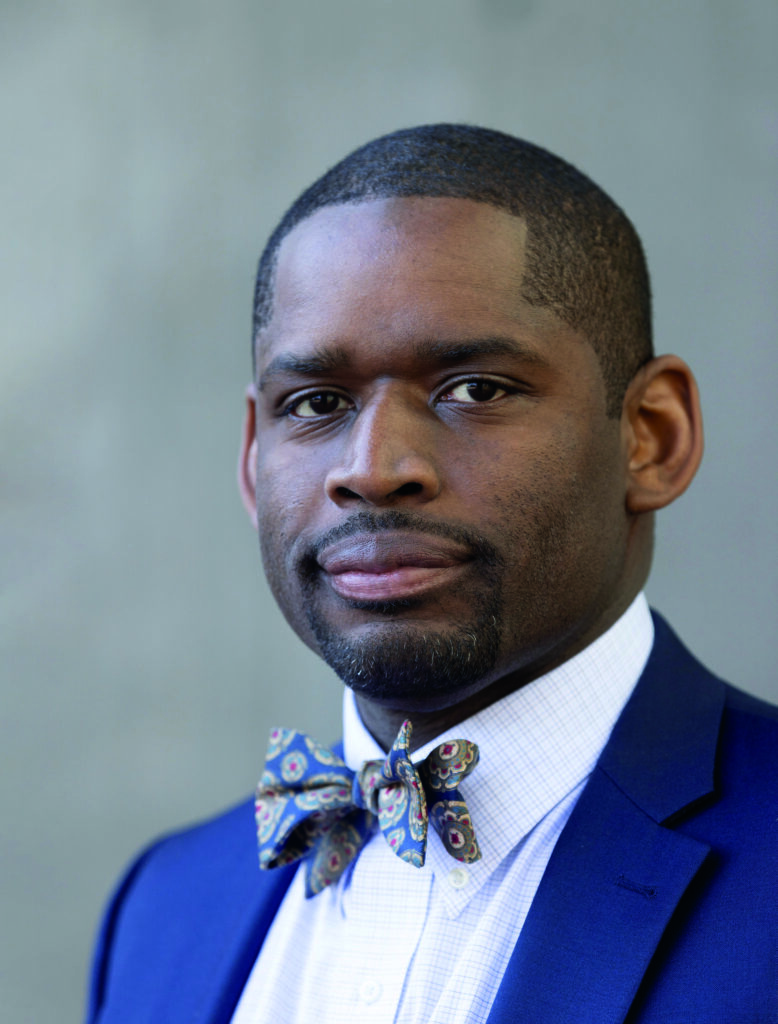Pernell T. Reid, M.D., ’03
DEGREES

B.S. in neuroscience; M.H.A., Suffolk University; M.S. in biomedical science, Tufts University School of Medicine; M.D., St. Martinus University, Faculty of Medicine
JOB TITLE
Senior vice president, Department of Otolaryngology—Head and Neck Surgery, Mass Eye and Ear (member hospital of Mass General Brigham)
FAVORITE TRINITY MEMORY
Joining St. Anthony Hall. It’s truly a special place. My time there provided an incredibly memorable experience and lifelong friends.
What do you do in your role?
In my role as senior vice president, I have both department and hospital responsibilities. In partnership with both the chair of otolaryngology and hospital president, I lead all business and administrative operations in clinical care, biomedical research, and education for the Department of Otolaryngology—Head and Neck Surgery. I’m also a member of the hospital’s Executive Leadership Council, charged with setting hospital-wide strategies, goals, and policies.
What was your path to your position?
I have always known I wanted a role in health care, but it wasn’t until I began the journey that I could better understand more specifically what position I wanted to pursue. I started my career in health care as an administrator working in different clinical settings and specialties before deciding to go to medical school. After medical school, I realized I missed the “business” of health care, and I returned to the operations side. I assumed more responsibility with each successive role, ultimately landing my current job as senior vice president.
Why do you prefer the operations side of health care?
I love the operations side of health care because I have the opportunity to influence every aspect of the patient experience and improve it. From the moment a patient calls to schedule an appointment to when they walk out of the hospital’s door after receiving cutting-edge treatment, I want their entire journey to be seamless.
What do you enjoy most about your work?
I very much appreciate the opportunity to support the delivery of world-class care. I work alongside the brightest, most talented, and dedicated group of individuals at one of the world’s best hospitals. The work environment is full of variability and unpredictability, so I thoroughly enjoy that no two days are ever the same. I also really like that a large part of my work involves problem-solving and big-picture strategy.
What are the biggest challenges you face?
Like most of the health care industry, I see the three biggest challenges right now to be in workforce availability, health care access, and disparities. There is a growing physician shortage, especially in primary care, neurology, and psychiatry. The trend is the same in nursing. Estimates put the number of uninsured in the United States somewhere between 10 and 15 percent. These individuals are less likely to utilize health care services including preventative screenings for cancer, diabetes, and heart disease. In addition, there are barriers that limit or prevent access to health care services beyond insurance. Social determinants such as race, socioeconomic status, education, and geographic location all impact health.
Was there a professor at Trinity who was particularly influential?
David Winer. I met Dr. Winer when I was a student in his “Psychology 101” class. I wasn’t the strongest student in the class, but he took a personal interest in me and really wanted me to succeed not only in his class but also throughout my academic career at Trinity.
Were there any activities beside St. Anthony Hall at Trinity that you particularly enjoyed?
Playing intramural basketball was a lot of fun. I’m very competitive, so having the opportunity to play in an organized league with minimal commitment was great. I also was a residential coordinator and enjoyed serving as a liaison between the residents of Ogilby and the College administration.
What advice would you give current students interested in a career in medicine, especially the operations side?
There are endless ways to pursue a career in medicine: being part of a clinical care team, medical education, biomedical research, and, of course, hospital operations, to name a few. Find opportunities to learn more; internships are a great example. Network as much as you can and reach out to alumni in roles like mine to better understand their journey. Trinity graduates are doing a lot of impressive things—ask for their help.
